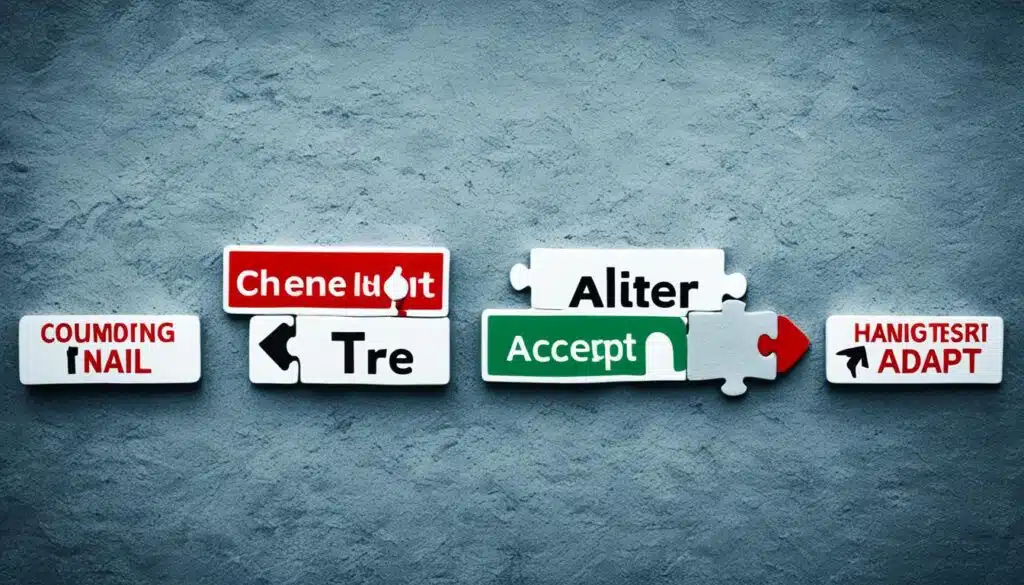Stress is common for everyone and can push you to work more. Yet, too much stress from big life events can hurt your body and mind. It’s key to know how to handle stress well before it’s too much. A mental health professional can teach you good ways to cope. Changing your lifestyle by being active, eating well, and sleeping enough can lower your stress too.
Also, doing things like meditation, breathing deeply, and relaxing your muscles helps right away. Creating a plan that fits you and looking after your whole self is how you keep stress low in the long run. Check out resources from the American Psychological Association and National Institute of Mental Health for more on beating stress.
Key Takeaways
- Stress is a natural part of life, but high levels can negatively impact health.
- Talking to a mental health professional can provide guidance on healthy coping mechanisms.
- Lifestyle changes like physical activity, a balanced diet, and good sleep habits can help reduce stress.
- Relaxation techniques like meditation and deep breathing can provide immediate stress relief.
- Developing a personalized stress management plan and embracing a holistic approach are key to long-term stress management.
Understanding Stress and Its Impact
Stress is a normal part of life, and everyone experiences it. But too much stress can hurt your mental and physical health. It’s key to know what makes you stressed. This could be from big life changes, everyday issues, or how you think and act.
Identifying Sources of Stress
Work pressure, family duties, money worries, and health problems are common stress points. Knowing these stress sources lets you make plans to handle them better.
Recognizing Unhealthy Coping Mechanisms
Finding and ditching bad coping ways like drinking, drugs, or avoiding people is vital. These can make stress worse. Using a smart strategy to cope, like changing bad thoughts, is good. Knowing what sets off your stress and finding positive ways to deal is the first step in reducing it.
| Symptoms of Stress | Effects of Stress |
|---|---|
| Headaches, muscle tension, fatigue | Increased risk of serious health problems, such as heart disease, high blood pressure, and depression |
| Difficulty concentrating, irritability, mood swings | Impaired cognitive function and decision-making abilities |
| Insomnia, changes in appetite, inability to cope | Disrupted sleep patterns, unhealthy behaviors, and a sense of control |
The Four A’s: Avoid, Alter, Accept, or Adapt

The “Four A’s” can help you handle stress. It means Avoid, Alter, Accept, or Adapt. Avoiding stress is about cutting out or cutting down on things that stress you out. This could mean learning to say no, setting boundaries, or leaving behind stress-causing situations or people.
Altering things is changing how you act or communicate. It’s about being more clear, finding middle ground, or making work and life balance better. Yet, if you can’t avoid or change something, accepting it and updating your view is key. You can change how you see problems, set realistic expectations, be thankful, and focus on what’s in your hands.
It also helps to talk with people you trust or a pro when stress is too much. Using the Four A’s gives you the power over stress. It stops stress from running your life.
Relaxation Techniques for Stress Relief

When stress hits, a toolkit of calm techniques is key for immediate relief. These methods help relax the mind, lower anxiety, and bring peace, making it easier to deal with stress now.
Guided Imagery
Guided imagery is about imagining a peaceful place vividly. You take your mind off stress by engaging all your senses. This brief escape lets you pause the stress of daily life.
Meditation and Mindfulness
Meditation and mindfulness keep you in the present moment. You focus on your feelings and thoughts without judging them. These practices are great for finding calm and peace within yourself.
Progressive Muscle Relaxation
This method involves tightening and then relaxing different muscle groups. It sends a relaxing wave throughout your body. This helps you let go of physical stress that often comes with mental pressure.
Deep Breathing Exercises
Deep breathing works by activating your body’s calming system. You take deep, slow breaths in through your nose and out through your mouth. This helps in managing stress and feeling more at peace.
You can use these techniques anyplace and anytime to deal with stress. Making these methods a habit offers lasting benefits for managing stress and feeling well.
Stress Management

Effective stress management is all about taking control of various aspects in life. This includes managing your thoughts, feelings, time, and surroundings. It’s vital to find what works for you because there is no universal solution. One good step is to keep a stress journal to pinpoint what causes stress and how you deal with it.
If you’re aiming for a stress-free life, creating a personalised stress management plan is essential. This plan should include different strategies like relaxation, changing your lifestyle, and seeking advice from experts when needed. A holistic approach to well-being can make you more resilient and better at handling stress.
The American Psychological Association and National Institute of Mental Health have plenty of stress management resources. By being proactive and using a variety of methods, you can effectively manage and decrease stress.
| Stress Management Strategies | Benefits |
|---|---|
| Keeping a stress journal | Helps identify personal stress triggers and coping mechanisms |
| Incorporating relaxation techniques | Promotes immediate stress relief and long-term resilience |
| Making lifestyle changes | Supports a holistic approach to well-being and manages stress |
| Seeking professional support | Provides guidance on effective stress management strategies |
Take a thorough and tailor-made way to stress management. This helps you know how to manage stress well. It also brings down your stress levels for a better sense of well-being.
Physical Activity: A Natural Stress Reliever

Exercising is a top way to handle stress. It makes our bodies produce endorphins, the feel-good chemicals. These lift our spirits and distract us from worries. You don’t need a long workout to feel better; even quick movements help.
Incorporating Exercise into Your Daily Routine
To cut stress, add more movement to your day. Take the steps, walk to places, or dance when you can. Moving more, whether in a workout or short bursts, helps. Consistency is key for enjoying the stress-relief benefits of being active.
Healthy Lifestyle Habits for Managing Stress
Along with relaxation and exercise, good healthy lifestyle habits are important for stress management. A balanced diet that includes lean proteins, complex carbohydrates, healthy fats, and antioxidants is beneficial. It lessens the effects of stress on your body.
The Importance of a Balanced Diet
A healthy diet is key with various lean proteins, complex carbohydrates, fatty acids, and antioxidants. These nutrients are necessary for your body to deal with stress. Eating these foods can make you feel better and less stressed.
Getting Enough Sleep
Getting adequate, high-quality sleep is crucial. Lack of sleep makes stress worse. Good sleep hygiene means having a set sleep time and avoiding screens before bed. It helps you sleep better and handle stress more effectively.
Stress Relief Supplements
Some supplements like melatonin, ashwagandha, l-theanine, and B vitamins can offer extra stress relief. They are part of a wellness plan that helps you better cope with stress over time. Using these healthy ways to manage stress can make you stronger and more resilient to stress.
| Nutrient | Benefits for Stress Management |
|---|---|
| Lean Proteins | Provide essential amino acids to support neurotransmitter production and brain function, helping to regulate mood and stress response. |
| Complex Carbohydrates | Steadily release glucose to fuel the brain and body, preventing blood sugar crashes that can exacerbate stress. |
| Healthy Fats | Omega-3 fatty acids have anti-inflammatory properties and can help modulate the body’s physiological response to stress. |
| Antioxidants | Help counteract the oxidative damage caused by chronic stress, supporting overall health and resilience. |
Positive Self-Talk and Cognitive Restructuring

How you talk to yourself matters a lot. Talking negatively to yourself can really ramp up your stress levels. It includes being too hard on yourself or thinking the worst. But, if you learn to talk in a positive, realistic, and kind way to yourself, it can reduce stress and anxiety.
Cognitive restructuring means finding and changing your bad thinking habits. This can make you more hopeful, help you control your feelings, and take positive steps when things get tough. Making a habit of speaking to yourself in a good way is key in fighting stress. It lets you manage how you feel and react.
By changing your negative thoughts into something more realistic and kind, you lower your stress and can handle problems better. In the end, talking kindly to yourself and restructuring your thoughts help a lot. They’re both big weapons against stress. They teach you better ways to deal with life’s pressures.
Social Support and Connections

Building strong social ties is key to handling stress well. Being with supportive friends and family helps. It causes your body to make oxytocin, a hormone known for making you feel calm. Talking to these people about how you feel can also ease stress.
Seeking Professional Help
If stress starts to take over your life, it’s time to get professional help. A therapist can guide you with techniques like cognitive behavioral therapy. This therapy can teach you better ways to deal with stress. The Department of Health and the American Heart Association have info on finding mental health help. Remember, combining support from loved ones with professional help is a strong approach to managing stress.
Also Read : Path Mental Health: Your Guide To Wellness
Hobbies, Creativity, and Leisure Activities
Spending time on hobbies and creative work can help you manage stress. It balances out your life with work. Activities like gardening or reading give your mind a break.
Being creative is self-care. It makes you stronger against stress. Doing what you love outside of work adds balance. This leads to a more fulfilling life.
Adding hobbies to your routine is key to stress management. It could be a new hobby or an old favorite. These activities boost your mood and build your strength against stress.
FAQs
Q: What is stress management?
A: Stress management involves using strategies to help you deal with and reduce the stress in your life.
Q: How can stress impact our lives?
A: Stress can lead to serious health issues and affect various aspects of our well-being.
Q: What are some common causes of stress?
A: Stressors, such as work pressure, relationship issues, and financial problems, can contribute to stress in your life.
Q: How can I reduce stress in the moment?
A: Relaxing your muscles, deep breathing, and practicing mindfulness are techniques that can help reduce stress in the moment.
Q: What are some effective strategies for stress management?
A: Managing your time effectively, engaging in physical activity, and learning how to manage stressful situations are all effective strategies for stress management.
Q: When should I seek professional help for stress management?
A: If you are feeling overwhelmed by stress and are unable to cope on your own, it may be beneficial to seek help from a therapist or counselor.
Q: How can I donate today to support stress management initiatives?
A: You can donate to organizations like the Mayo Clinic that focus on stress management research and education to support efforts in reducing stress in our communities.
Q: What are effective strategies for stress management?
A: Effective strategies for stress management include identifying stressors, practicing relaxation techniques, getting regular physical activity, and managing your time effectively.
Q: How can I reduce stress in my life?
A: You can reduce stress in your life by practicing mindfulness, engaging in regular exercise, getting enough sleep, and seeking support from friends and family.
Q: What is the role of Mayo Clinic in stress management?
A: Mayo Clinic provides valuable resources and information on stress management techniques, advice on coping with stress, and access to experts who can help you develop a personalized stress management plan.
Q: What are common causes of stress?
A: Common causes of stress include work pressure, relationship issues, financial problems, health concerns, major life changes, and lack of work-life balance.
Q: How can I manage stress in the moment?
A: To manage stress in the moment, you can practice deep breathing exercises, visualize a peaceful place, engage in physical activity, or use positive affirmations to calm your mind.
Q: Why is it important to relax your muscles for stress relief?
A: Relaxing your muscles can help alleviate physical tension and reduce stress levels as the body and mind are interconnected, and muscle relaxation signals the brain to relax as well.
Q: How can time management help in reducing stress?
A: Effective time management helps in reducing stress by prioritizing tasks, setting realistic goals, avoiding procrastination, and creating a structured daily routine that allows for breaks and relaxation.





